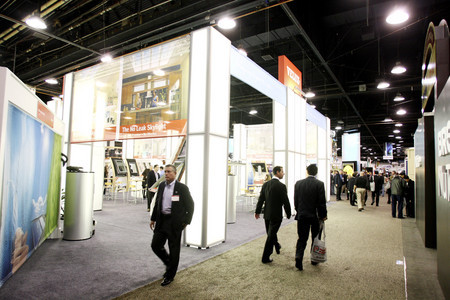Observer sees more suffering
For the first time in 27 years, the International Builders Show won't feature The New American Home, a showcase of the latest home-building concepts, materials and construction techniques that eventually find their way into production homes across the nation.
The home being built by Domanico Custom Homes of Las Vegas was on schedule for completion in time for the industry trade show presented by the National Association of Home Builders that runs through Friday at the Las Vegas Convention Center.
Then it got caught up in the credit crisis that has hammered the home-building industry. The private lender that was financing the project ran into its own credit problems and had to withdraw funding.
That's a pretty good indication of what lies ahead for homebuilders in 2010 and beyond.
"This has been the worst downturn we've seen since the Great Depression," NAHB chief economist David Crowe said Tuesday at the International Builders Show. "Builders that are here today are the great survivors."
Crowe is projecting roughly 700,000 new housing starts in 2010, including about 610,000 single-family homes. That's up from about 550,000 in 2009.
Frank Nothaft, chief economist for Freddie Mac, put the number a little higher at 770,000 to 780,000, while Dave Berson, chief economist for PMI Group, was more conservative at 675,000.
Berson said there will be some "pulling forward" of demand with the federal tax credit for first-time and move-up buyers. As long as the economy sees even modest job gains, there should be continued demand after the tax credit expires, he said.
Rising mortgage rates are a concern, but Berson said he doesn't expect to see them "explode." Stronger job growth should help to offset any modest increase in rates, he said.
Nothaft thinks 30-year, fixed-rate mortgages will stay around 5 percent to 6 percent this year, with Federal Housing Administration and Veterans Affairs loans accounting for about one-fourth of all lending in 2010. Loan originations will decline by 10 percent due to fewer refinancings.
Mortgage defaults will rise, triggered by unemployment and declining home prices, he said.
New-home sales, which are competing with foreclosures, are projected to decline by 23.3 percent nationally in 2009. In Las Vegas, they're down 48 percent through November, Las Vegas-based SalesTraq reported.
Sales should climb more strongly in 2010, once the payback period from last year's tax credit is complete, Berson said.
Crowe said he sees "continued suffering" for Las Vegas' housing market this year.
"The amount of product in foreclosure or for sale is significant in Las Vegas and I don't see the demand to fill that," the NAHB economist said.
Nothaft said the bottom for Las Vegas will probably come in 2011, not this year.
"I don't think delinquency rates have peaked yet," he said. "That's usually six to 12 months after employment recovery begins. We'll see them peaking in the second half of 2010."
The housing market showed broad signs of stabilizing in the second half of 2009, although risks of retrenchment remain high in the face of heavy flow of foreclosures and bank-owned homes, potentially depressing prices further in the hardest-hit areas, Nothaft said.
Berson said a recovery in home prices is about three years away because banks are still holding a lot of foreclosure inventory. They don't want to depress prices further by dumping all the homes on the market at once, so the cycle is being delayed, which is probably better for the economy in the long run, he said.
"I'm not sure we'll see any markets surge," Berson said. "They're hard to identify. Maybe markets where the job situation is not as bad and they don't have the overhang of homes for sale, from the Great Plains states down through Texas and the Southeast, excluding Florida."
Contact reporter Hubble Smith at hsmith@reviewjournal.com or 702-383-0491.























